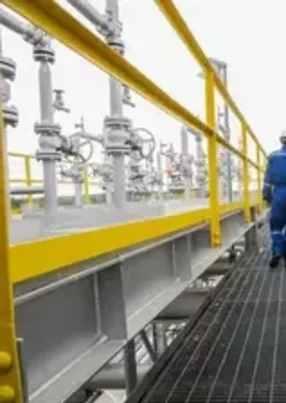Embracing technology in the oil and gas industry with Exterran
For manufacturers today, digitisation is vital if they want to remain one step ahead of the competition and perhaps nowhere can this be seen better than in the oil and gas industry.
Regarded as a proactive solutions provider to a range of global and regional oil and gas customers, Exterran is now embarking on the first phase of its digital transformation plan. Suraj Devadiga, Director of Supply Chain of Middle East & Asia at Exterran, highlights how the company’s procurement function has become a key part of Exterran’s operations. “In the past, procurement used to be where purchase orders were made. The company would say ‘I need this, go and buy it’ and it would be the job of purchasing to buy and provide it,” explains Devadiga. “What’s different now is that we ask lots of questions to drive value. Are we buying at the best price and is it in our plan? If so, are we buying it from suppliers who are qualified? Is this supplier consistent? Are we going to create a museum of suppliers and then end up having to spend more on maintaining parts and services? It’s important to figure out exactly what we’re enabling.”
Implementing digitisation
Having previously worked in India at General Electric Oil & Gas in a variety of different roles such as Senior Product Manager, Business Manager and then Head of Supply Chain Integration, Devadiga is well-positioned to oversee the beginning of Exterran’s digital transformation as it begins to digitise its operations. “We’re in the process of digitising our supply chain operations in order to implement the same ERP globally and we’re also introducing the necessary digitisation platforms to enable engineering teams to work seamlessly across our locations in Houston, the UAE and Singapore. It also allows us to connect with the supply chain team which, similarly, is on a platform that allows us to collaborate as a global supply chain organisation,” he explains. “We’re very much in the nascent stages of digitisation and I believe our approach of low investment, high return is vital.”
“At our current stage of digitisation, we have invested in two key things. Firstly, we have remote monitoring and diagnostics equipment that allows us to collect, collate, synthesise and then analyse information from equipment across various sites worldwide. Once we have refined our operations in one area, we can then implement this approach across our various locations which have the same operating dataset,” he says. “Digitisation is also enabling to us reduce our operating expenditure and better manage our finances.”
Devadiga believes the transition of three enterprise resource planning (ERP) systems to two has been key to his company as it looks to implement phase one of its digital transformation. “In the third quarter, we’re targeting for all our pilots to be completed and launched to the platforms. We must be very judicious, take the feedback and refine it because you need a strategically significant dataset,” says Devadiga. “One of the big hurdles has been that we don't have a contract operations site in the US where we just sell products. However, in terms of the rest of the world, we have more of a 360- degree solution approach because we don’t just sell products but we also build, own, operate, and maintain them over five to 10 years. Ultimately, it’s the big global sites in Argentina, Oman and Thailand where the first phase of our digital transformation plan will be launched.”
Forming key partnerships
Exterran has begun to work with Oracle across all its sites in North America and Latin America. Through the company’s collaboration with Oracle, Devadiga believes his company has utilised ERP to introduce pilots successfully. “In the western hemisphere, all our sites in places such as North America and Latin America with the exception of Peru are on Oracle. During the past year, our Middle East operations in Oman and Bahrain as well as our manufacturing facility in the UAE and Dubai are all on Oracle. But, Pakistan, Nigeria, Thailand, Indonesia and the entire Asia-Pacific region still use Sage Accpac as an ERP. That's why we’re rolling out these pilots only in the Oracle ERP areas.”
The importance of establishing and maintaining key partnerships is fundamental to all successful businesses. Exterran has collaborated with industry leaders such as General Electric, Ariel Compressors, Caterpillar Engines and Atlas Copco. Devadiga affirms that a good working relationship with partners is vital to success. “Our partners are extremely important,” he says. “From our perspective, there’s a very high degree of dependency on these original equipment manufacturers (OEMs). We need them to value our association as a delivery model for their products into the oil and gas industry because we’re packagers of their machines and we buy the engine and compressor from the engine manufacturer. However, these two units don't do anything by themselves. The engine and compressor must be together and installed with the associated piping and other components in a manner that fulfils the purpose for which that compressor has been designed. That capability exists with us because we develop the solution in order to process and treat that gas. It’s up to us to select the compressor that Ariel may be manufacturing and marry it to the engine that Caterpillar might be manufacturing.”
Looking to the future
Looking forward, Exterran is set to remain acutely focused on its digital transformation strategy. Valuing a mentality of “knowledge is power”, Devadiga believes it’s important to remain vigilant when gathering data in the digital space. “We can’t improve when we don't know what we need improve on. The journey to knowledge starts with three simple words which are extremely difficult for most people to say: ‘I don't know’. But the moment we admit that we don't know, that’s when we can start our journey,” explains Devadiga. “We’re in the first stage of collecting data and transforming that data into information. But if we can implement tools where the information can be gleaned from the data and made available to managers both at a high and mid-level, it will create a knowledge base that will allow us to scale up from being this $1-3bn company and hit the $5bn mark. That has to be the goal.”



